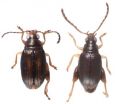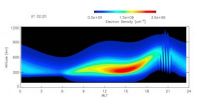(Press-News.org) Only five species of these so-called 'flea' beetles, out of a global total of 60, had been found to date in New Caledonia, in the western Pacific. A three-year study has now enabled Spanish researchers to discover two new herbivorous beetles – Arsipoda geographica and Arsipoda rostrata. These new beetles hold a secret – they feed on plants that the scientists have still not found on the archipelago.
"The study, financed by the National Geographic, went some way beyond merely classifying species, and investigated the ecology of these herbivorous insects with a prodigious leaping capacity, which they use to avoid their predators", Jesús Gómez-Zurita, lead author of the study and a researcher at the Institute of Evolutionary Biology (CSIC-UPF) who is passionate about New Caledonia and collected hundreds of beetles in order to study them, tells SINC.
The researchers, from Spain and New Caledonia, used previously-developed molecular tools in order to classify the DNA sequences of the animals' diet, in particular chloroplast DNA (which is exclusive to plants). The team used plant matter remains found in the digestive tract of the insects at the time they were killed in order to extract their DNA at the same time.
According to the study, which has been published in the Journal of Natural History, this technique made it possible to discover that one of the new species, Arsipoda geographica, which measures three millimetres, feeds on a tropical plant in the mountains (Myrsinaceae), while Arsipoda isola, which is the same size, feeds on another plant (Ericaceae) in the southern jungles of the island.
"The strangest thing is that the DNA sequences of the plants are from botanical species that have still not been found on the archipelago. This provides indirect evidence of the existence of an enigmatic botanical diversity, which should be more than expected on an island with a wealth of lush vegetation", says the researcher, who has been studying beetles for 20 years.
The study, which is the first in this research line focusing on the Chrysomelidae family (known as 'leaf beetles' because they feed primarily on plants), made it possible to collect more than 2,000 beetle samples on the island of Grande Terre, compare them with other species, and carry out a phylogenetic analysis. So far, three new species have been found, two of which are described here.
New Caledonia, a still unknown territory
"The interest in New Caledonia has recently been renewed as a result of the discovery that the archipelago may have remained completely submerged over a lengthy period up until the Oligocene (more than 23.5 million years ago), when it emerged again, which would mean its fauna and flora originated much more recently than had previously been speculated", explains Gómez-Zurita.
The numerous insects and beetles on the archipelago, are great number of which are endemic, "are the great unknowns of this biota", says the biologist. "This study of their diversity and similarities without any doubt holds the keys to understanding the evolution of life in this part of the world", he adds.
The isolation of New Caledonia in the western Pacific, which became separated from Australia 70 million years ago, has led to "the evolution of some very unusual biotas that have not had any contact with the rest of the world for enormous period of time", the scientist explains.
INFORMATION:
References:
Gómez-Zurita, J., Cardoso, A., Jurado-Rivera, J.A., Jolivet, P., Cazères, S. Mille, C. 2010. "Discovery of new species of New Caledonian Arsipoda Erichson, 1842 (Coleoptera: Chrysomelidae) and insights on their ecology and evolution using DNA markers" Journal of Natural History 44(41-42): 2557-2579, 2010.
2 new species of 'leaping' beetles discovered in New Caledonia
2011-01-19
ELSE PRESS RELEASES FROM THIS DATE:
New research examines how HIV infections occur on the molecular level
2011-01-19
The UK's National Physical Laboratory (NPL) with the University of Edinburgh and IBM's TJ Watson Research Center have published new research about the structure of an HIV-1 protein that could help to develop new drugs to stop the virus infecting healthy cells.
The research provides a new insight into how the changes in structure of a small part of an HIV protein (a membrane proximal peptide) may alter the infection of the virus into healthy cells. The team was able to observe key changes in this part of the protein implicated in the early stages of the infection by using ...
Revealed: 48-hour 'scramble' to discredit MMR concerns
2011-01-19
A series of denials and a failure to formally investigate allegations of misconduct in Andrew Wakefield's MMR research meant the public was misled about the credibility of the paper for six years.
Dr Fiona Godlee, BMJ Editor in Chief, says the UK has consistently failed to take research misconduct seriously. She calls on the UK government to establish mandatory oversight of clinical research integrity within the NHS, as happens for publicly funded research in the USA.
"This case reveals major flaws in pre and post-publication peer review," she says. "Allegations of ...
Nanotech medicine
2011-01-19
According to the World Health Organisation (WHO), an estimated 322,000 deaths globally per year are linked to severe injuries from fire and in many of these cases death could have been avoided with surgical intervention.
In this type of intervention, when major burn patients have insufficient skin left to graft on the most damaged part of their body, new skin has literally to be grown from the patient's own skin cells. However, the long delay in growing the skin can expose the burns patient to increased risk of infection and dehydration; so to help those cells to multiply, ...
Travel websites should inform people about malaria, say doctors
2011-01-19
Travel websites, especially those that offer 'last minute' deals, should inform people about the risks of malaria and the need to take preventative medication before travelling, say experts in infectious diseases today.
Their warning, in a letter to this week's BMJ, follows three recent cases of malaria in UK citizens returning from 'winter sun' holidays to the Gambia, where malaria is highly endemic.
They all used the same travel website. Two had made a late booking and all failed to take preventative drugs (chemoprophylaxis). Within two weeks of returning to the UK, ...
Answers to black hole evolution beyond the horizon?
2011-01-19
One of the most important predictions of Einstein's theory of General Relativity is the existence of black holes. The dynamics of these systems are not yet fully understood, but researchers from Queen Mary, University of London have now provided a rigorous way of determining the evolutionary stage of a black hole by analysing the region outside where matter cannot escape, the event horizon.
Dr Thomas Bäckdahl and Dr Juan A. Valiente Kroon at Queen Mary's School of Mathematical Sciences have developed a method based on properties of the Kerr solution, a time-independent ...
Adult ADHD significantly increases risk of common form of dementia
2011-01-19
Adults who suffer from attention-deficit and hyperactivity disorder (ADHD) are more than three times as likely to develop a common form of degenerative dementia than those without, according to research in the January issue of the European Journal of Neurology.
Researchers from Argentina confirmed the link during a study of 360 patients with degenerative dementia and 149 healthy controls, matched by age, sex and education. The dementia patients comprised 109 people with dementia with Lewy bodies (DLB) and 251 with Alzheimer's.
"Our study showed that 48 per cent of ...
Are sharks color blind?
2011-01-19
Sharks are unable to distinguish colors, even though their close relatives rays and chimaeras have some color vision, according to new research by Dr. Nathan Scott Hart and colleagues from the University of Western Australia and the University of Queensland in Australia. Their study shows that although the eyes of sharks function over a wide range of light levels, they only have a single long-wavelength-sensitive cone* type in the retina and therefore are potentially totally color blind. Hart and team's findings are published online in Springer's journal Naturwissenschaften ...
Biological Psychiatry special issue: Postmortem research
2011-01-19
Philadelphia, PA, 18 January 2011 - Biological Psychiatry is proud to announce this week's publication of a special issue focusing on postmortem studies of psychosis.
This special issue showcases the use of human brains postmortem to study psychiatric disorders, focusing on schizophrenia. The review articles highlight the benefits, achievements, problems, and perhaps most importantly, the future of postmortem research.
Postmortem research, which allows scientists to study the brain directly via its tissue, is difficult and expensive. Hence, it is a relatively rare avenue ...
Breakthrough for more efficient drug development
2011-01-19
Developing new drugs is a highly costly and time-consuming process. Of 20 candidates, 19 are normally rejected because they don't work or have unwanted side effects. Now a research team led by Professor Lars Baltzer at Uppsala University has produced a tiny molecular "binder" that has the potential to change this landscape radically.
The study, published today in the prestigious journal Angewandte Chemie, presents the concept of a tiny polypeptide consisting of 42 amino acids to which virtually any target-seeking organic molecule can be bound. In the body it then seeks ...
NRL scientists develop 3-D model of the ionosphere F-region
2011-01-19
WASHINGTON -- The first global simulation study of equatorial spread F (ESF) bubble evolution using a comprehensive 3D ionosphere model, SAMI3, has been demonstrated. The model self-consistently solves for the neutral wind driven dynamo electric field and the gravity driven electric field associated with plasma bubbles.
Developed by Dr. Joseph Huba and Dr. Glenn Joyce at the NRL Plasma Physics Division, SAMI3 is a fully three-dimensional model of the low- to mid-latitude ionosphere. SAMI3 has been modified recently to use a sun-fixed coordinate system to eliminate rotation ...

